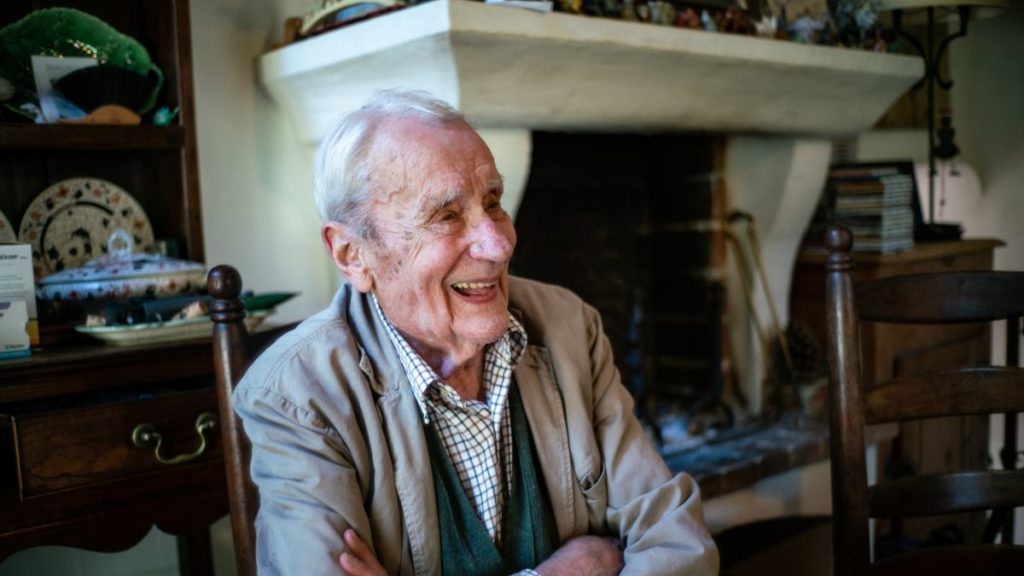
Christopher Tolkien, son of J.R.R. Tolkien and the last of the Inklings, died January 15 at the age of 95 the New York Times reports.
For nearly 50 years after his father passed away in 1973, Christopher continued to edit and publish his father’s unfinished manuscripts, giving J.R.R. Tolkien’s literary output the benefit of two lifetimes’ work. Christopher assembled from pieces the epic Middle-Earth predecessor to Lord of the Rings, melding them into The Silmarillion (1977). In all, he edited or oversaw the publication of two dozen editions of his father’s works, many of which became international best sellers.
Along the way he produced 12 volumes of The History of Middle-earth, a compilation of drafts, fragments, rewrites, marginal notes and other writings that showed the evolution of J.R.R. Tolkien’s legendarium.
Christopher is also credited with creating the acclaimed 1954 map of Middle-earth.
During World War II, when Christopher was serving with the Royal Air Force in South Africa, his father mailed him parts of The Lord of the Rings for comment and editing.
After the war he studied English at Trinity College, Oxford, taking his BA in 1949 and his B.Litt a few years later. He became a lecturer in Old and Middle English as well as Old Icelandic at the University of Oxford.
In 1945, he became the youngest member of the Inklings, a circle of Oxford writers and scholars started in the Thirties by C.S. Lewis, J.R.R. Tolkien, and others, who met weekly in Lewis’s college rooms. Christopher was told in a letter from his father that the Inklings proposed to consider him “a permanent member, with right of entry and what not quite independent of my presence or otherwise.”
Dr. Diana Glyer, author of two books about the Inklings, including The Company They Keep: C.S. Lewis and J.R.R. Tolkien as Writers in Community, mourned his passing:
I must refer now to all the Inklings in past tense; the last of them has died. I met Christopher Tolkien, talked with him, corresponded from time to time. I have devoted my life to studying the Inklings. Today, they have slipped from solid, real, and tangible into the past, beyond reach. I no longer have the privilege of studying what is, only what was. Everything has changed.
J.R.R. Tolkien biographer John Garth ended his Facebook announcement of Christopher’s death with this fitting quote from the end of Lord of the Rings:
“Well, here at last, dear friends, on the shores of the Sea comes the end of our fellowship in Middle-earth. Go in peace! I will not say: do not weep; for not all tears are an evil.”
Christopher is survived by his second wife, Baillie, his sister Priscilla, and three children, Simon, Adam and Rachel.
Discover more from File 770
Subscribe to get the latest posts to your email.

A real loss.
How sad that the Last of the Inklings has passed from this Earth. And how wonderful that they persisted as long as they did.
My own CJRT story is a very modest one, but worth recording. I had no direct contact with CJRT, but an editor who did approached him on my behalf. My query was this: JRRT had said that C. A. Johns’s Flowers of the Field was his favorite book in his adolescence. But which edition had JRRT owned? My research had turned up puzzling variety. CJRT responded with a detailed bibliographic description of the book, which his father had written up in the 1930s for insurance purposes. I was able to get a copy for myself (at a nice low price) and write an article about it. That was Christopher’s helpfulness in action. The books and articles of others acknowledge the man’s assistance.
Now that Christopher has died, who can be approached with questions such as that? Who will possess the profound knowledge of JRRT’s papers, personality, and intentions that CJRT had, so important for scholarly questions? Of course, CJRT also understood the context of his father’s life better than almost anyone, not only because of his intimate filial relationship, but because he knew firsthand the old Oxford — before it abolished, for example, the Beowulf requirement.
The editions of his father’s work were prepared just right. On one hand he made the presentation of fragmentary work intelligible. On the other hand, what he gave us was, so far as I can tell, an accurate and faithful record of JRRT’s work. He didn’t, for example, take the unfinished but extensive and intriguing Notion Club Papers and “complete” it or hand it over to some other author to make a commercially appealing NEW NOVEL BY J. R. R. TOLKIEN and Irving Forbush.
We are indeed fortunate in having had CJRT’s labors for almost half a century. Thanks to him, the golden age of Tolkien scholarship came to be. Christopher Tolkien was the indispensable man.
Happily, there are several fine Tolkien scholars — all of whom, I suppose, are indebted to CJRT — remaining. I would name Tom Shippey, Douglas Anderson, John Rateliff, Verlyn Flieger, Dimitra Fimi, John Garth, and they don’t exhaust the list of Tolkien scholars with real accomplishments to their credit.
Still, I have no doubt that the golden age of Tolkien scholarship just ended.
Requiscat in pace.
The Silmarillion would not exist if not for him, and we would have a poorer field of Tolkienania if not for that.
A huge loss.
After reading the Hobbit & Lord of the Rings, I got (by begging Mum to buy them) The Silmarillion & the Book of Lost Tales. And that was my introduction to Christopher Tolkien. When you consider how much more of Tolkien’s work was published after his death, how much was due to Christopher’s efforts, it is clear the massive contribution he made.